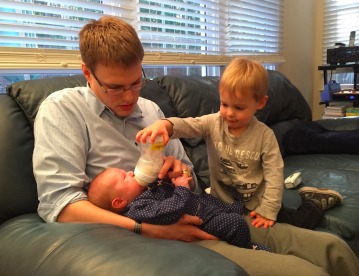
Maybe you’ve seen this face around Duke. You may recognize him as the guy who likes to rep the USA in his flag suit at the Durham VA every once in a while (see photos below for proof), but we know him as Christopher Hostler, MD, MPH, husband, father of two, huge fan of Army football, and one of our Internal Medicine Chief Residents. After this year, Dr. Hostler will continue his fellowship in Infectious Disease. Read all about him here:
How long have you been at Duke?
I came to Duke in 2007 for medical school, thinking I would be here for 4 years and then head back up to the northeast. Now I can’t imagine
being anywhere else. I just joined the division of GIM in June 2015 for a one year appointment as one of the Chief Residents for the Internal Medicine residency program. Next year I’ll return to my fellowship in Infectious Diseases.

What are your responsibilities within the division?
As Chief Resident at the VA, my primary responsibilities are for the education and training of our house staff. I partner with Dr. Simel, the Chief of the Medical Service, to oversee the inpatient and consultative medicine services that have house staff involvement.
Could you tell us more about your role as a researcher?
My primary research interests are in the field of infection control. I am currently working on a project related to the FilmArray assay we use at the VA on positive blood cultures and plan to do research with DICON (Duke Infection Control Outreach Network) as well.
How did you get into this field?
As far as my position as Chief Resident is concerned, I was fortunate to be asked to serve as Chief during my SAR year.
As far as my research interests are concerned, I developed an interest in infection control early on in my residency. I got an MPH while I was in medical school and I really enjoy studying the epidemiology of disease and looking at systems based approaches to prevent transmission of infections.
How has your subject area changed?
Infection control is changing rapidly at Duke. In the past, this was a very reactionary field, but thanks in part to the emergence of DICON and the forward thinking nature of a lot of our ID faculty, there are a lot of prospective studies ongoing to determine the best ways to improve infection control.
One of the areas I’m looking at now involves determining a resistant organism “colonization threshold” above which the risk of ward transmission of resistant organisms increases significantly. In the future, we will be able to use realtime data on colonization pressure to intervene on the wards and protect our patients from multi-drug resistant organisms.
What passions or hobbies do you have outside of the division?
I love playing sports, particularly soccer, football and racquetball. I also love spending time with my wife and 2 children.
Any recent readings that would be of interest to the division?
I’m in the middle of reading Paul Kalanithi’s book When Breath Becomes Air. It’s the insightful and heartbreaking
memoir of a young neurosurgery resident who is diagnosed with metastatic lung cancer. It’s always interesting to me to read about how physicians deal with illness, as they have a unique perspective as both doctor and patient.
Fun Fact! What is a fun fact about you that people may not know?
My children share a birthday and aren’t twins (Cameron David was born on 1/24/2014 and Eleanor Lynn was born on 1/24/2016). I’ve also been to 28 Army/Navy football games in my life (and watched the 3 I missed on TV). Go Army!